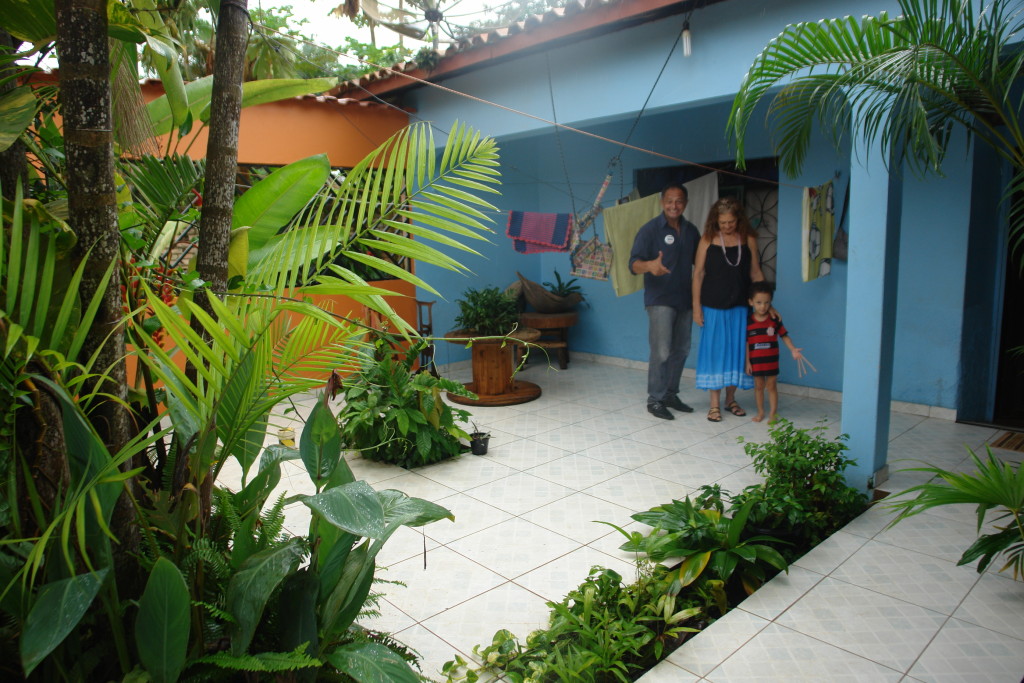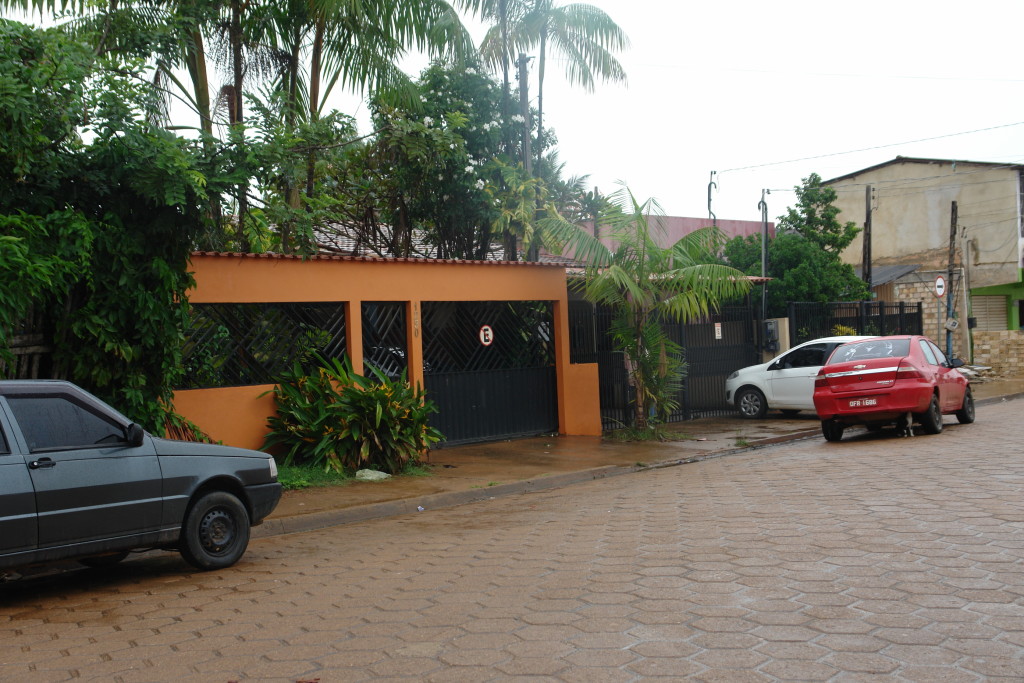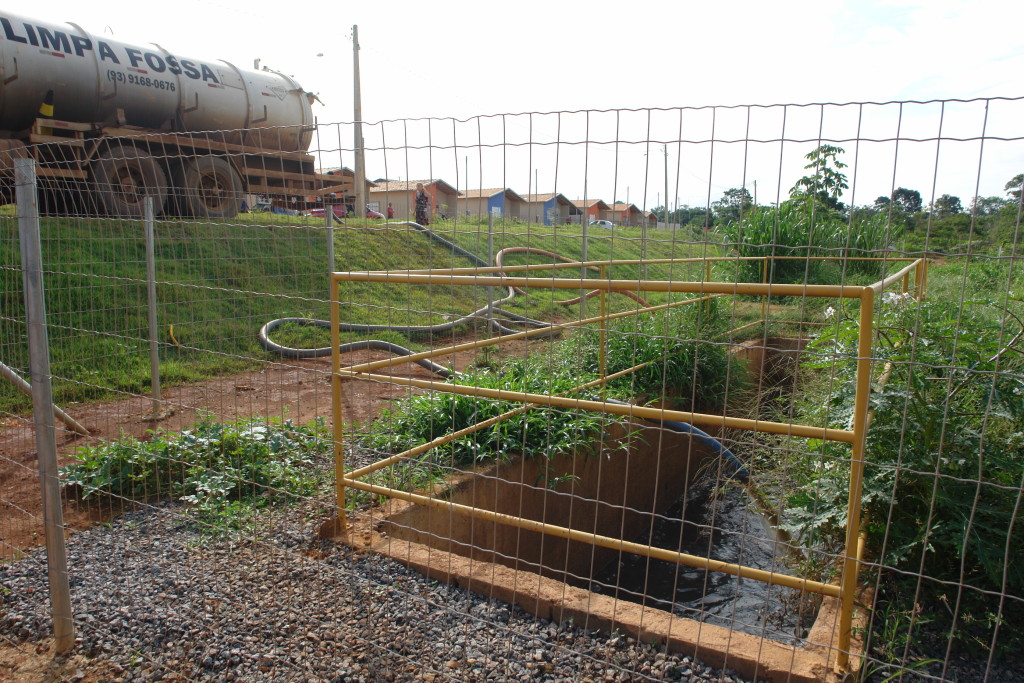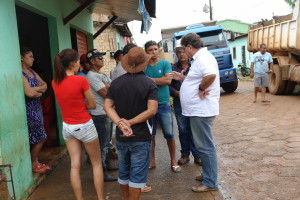News
Belo Monte to take on a lot more than stilt huts in Altamira

Demolished houses affect the neighbours
Source : Xingu Vivo
Local inhabitants and tradesmen in the city’s central district still have no idea how much they will get for their houses and establishments, a long way from the stilt huts which symbolize the affected people in Norte Energia Consortium’s advertisements.
“By the end of February all the houses on this street will be knocked down”, declares engineer Marcelo Silva, bearing the Norte Energia consortium’s logo on his chest. Surrounded by outraged locals, Silva was cornered on the Sete de Setembro, located in the Açaizal area of Altamira’s central district in the Brazilian State of Pará.
|
|
|
Norte Energia engineer Marcelo Silva (in white), |
The event took place last Monday 9th and carries on from what was revealed at the beginning of February that Norte Energia intends to dislodge two thousand families from Altamira by the end of March on the basis of “doing whatever it takes”. The company is in a rush to license its operation via IBAMA, having applied for the license this Thursday 11, which will permit the filling of the plant’s reservoir and commence energy production which was initially scheduled for February 28. Delays are said to cost hydroelectric energy entrepreneurs millions in fines if the National Agency for Electrical Energy (ANEEL) decides to charge its stated amount.
However in order to license the operation, and if IBAMA chooses to issue the license ensuing full compliance of the law, Norte Energia will have to finish the execution of pending constraints of previous Belo Monte installation permits, including the extraction and relocation of all the families affected by the power plant.
Unlike the images of fragile huts balanced on stilts, erected in muddy swamps – the abodes of the “lucky” inhabitants will be transferred from these, to the little concrete houses of Norte Energia’s urban resettlement schemes - the consortium and the press widely divulge that what you see on the Sete de Setembro and its surroundings are solid houses, a supermarket, multiple businesses and a church.
The prettiest house on the street has an orange wall and an iron gate which both guard a well looked-after front porch with tiles and flower beds. Its occupant is well known, not just in Altamira but all over the country and even abroad: Antônia Melo, 65, coordinator of the Xingu Vivo Forever movement (Xingo Vivo Para Sempre), is among the thousands of families registered by Norte Energia as awaiting eviction and which still have not been consulted by the company with information concerning compensation or resettlement.
 Antonia Melo with her brother and grandson in front of her house
Antonia Melo with her brother and grandson in front of her house
The land on which Antônia’s family live is 743.36 m2. The house, which is big, well ventilated and cosy, takes up just less than half this space, and out the back there is a garden growing wild with innumerable fruit trees, flowers and ornamental Amazonian plants and it produces larch quantities of açaí, mangoes and bananas each year. “In June 2014 employees from Norte Energia came here to register my house and tell us that we will be displaced. They have not reappeared since. We don’t know how much compensation they intend to offer us, we don’t know when they intend to displace us, we don’t know anything”, informed Belo Monte’s most active opponent. It is worth mentioning an important detail: “Despite the fact that this area belongs to the centre of Altamira, Norte Energia classified us as a suburb in order to lower the compensation costs. They do not want to consider the built up area part of our land either, arguing that we don’t have sanitation and therefore wouldn’t be owners of ‘built areas’. To top it all, they still intend to use the quote established in 2012 to calculate the values, which is utter nonsense in terms of the hyper evaluation of Altamira’s property and land prices in recent years”, Antônia explains.

Home of Antonia Melo, the Xingu Vivo Movement coordinator, under threat of demolition
Undergoing exactly the same situation is Aparecida Souza, the owner of the Souza & Pena market which takes up a whole corner on the Sete de Setembro, and Helio Melo da Cruz, whose Bed & Breakfast of two stories and 228m2 takes up the next corner down on the Travessa Coronel Gaioso. Aparecida and Melo were also consulted by Norte Energia in July, never to see any sign of life from the company again either, nor do they know how much they will receive for the establishments and they do not know where they are going to end up.

Aparecida's market (left). Melo outside his b&b (right).
Road sign reads Central Region/District
While it leaves a large number of locals from Açaizal feeling uncertain, Norte Energia has removed some families and demolished their houses seemingly at random. According to the inhabitants which spoke with engineer Marcelo Silva last Monday, these actions have severely affected the neighbouring houses. “You come and knock down a house while there are people living next door. It upsets everything in our house and anything is in danger of falling on of us. What do you think you’re doing??” an inhabitant questions heatedly, while another takes out a cell phone to tape the argument. Clearly frustrated, Silva has no response. “I lived abroad and I returned to Brazil to help you. If what you’re recording puts me in any danger, I’m leaving!”, argues the uncouth engineer.
The resettlement
According to the Belo Monte Environmental Impact Assessment (EIA, volume 33, item 12.9.4.3), the central objective of the power plant’s dislodged family resettlement project is to “guarantee superior living conditions to those of the affected population prior to the implementation of this enterprise”, as stressed by the Federal Public Minister in speaking out against the resettlement structures.
One of Antônia’s neighbours was already notified of imminent eviction and fought an arduous battle in Court to guarantee minimum compensation. She obtained a small house in the Jatobá resettlement and got another one for her daughter. She left behind a large house with a garden, her friends and the ease of living in the centre, and was meanwhile allocated a thin and hot concrete house, just like hundreds of others, on arid land, over eight kilometres from the town and from work and completely deprived of public transport. The livelihood of Cecílio Kayapó, a local fisherman, was also rendered unfeasible by the distance and lack of transport. “After the move, I barely ever worked again”, says the indigenous native with a somewhat glazed expression.
Vanessa Felix, another inhabitant of Jatobá who shares the house with seven others, lists two more serious hardships beyond all Gracinda and Cecílio’s struggles. She lives on the outskirts of the resettlement’s sewage treatment station… a big cesspit where tank trucks deposit waste collected from houses in the area, non-stop night and day, leaving the rancid air in the street practically unbreathable. The complaints carried no weight and worse still, despite being displaced from their houses by Norte Energia without a choice, the resettled inhabitants will not receive any kind of certificate or other documentation to prove ownership of the new house, that which will perhaps enable others to sell the house on.

Trucks incessantly pour waste into cesspit outside
Vanessa's house at Jatobá settlement
According to Public Prosecutor, Francisco Nobrega who has provided legal services to the population affected by Belo Monte as of mid-January, this situation is completely unlawful. According to the defender, a contract is made between parties when families are evicted from their homes for resettlement but this does not guarantee ownership over the new property. “Norte Energia maintains that it will regulate the situation of the resettled inhabitants once the relocation process of the people is complete, but at the moment the situation is illegal”, he explains. When asked if there were conditions on which IBAMA may issue a permit for Belo Monte, Francisco Nobrega insists: “No. We from the defender institution have huge demands from cheated residents, and considering the extremely precarious infrastructure we have to work with, we are only able to see to the most serious cases; cheated residents, new houses crumbling and so forth. There is still much to resolve in terms of compliance with the conditions”, the lawyer states.
© Xingu Vivo - traduced from portugese by Félix Charnley / artigo original
Date : 12/02/2015

